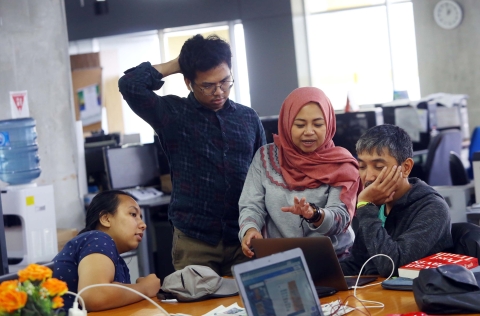
Misinformation can spread fear and erode trust, affecting voter behavior and even inciting violence. To help verified facts reach the widest possible audience, TruthBuzz Fellows with the International Center for Journalists (ICFJ) are working to bring new fact-checking formats and engagement strategies to newsrooms.
The five Fellows work in some of the world’s most populous nations. One is in Indonesia, where false information is going viral ahead of the 2019 presidential election. Another is studying misinformation in India, where mob violence killed at least two dozen people in 2018 after false child-kidnapping rumors spread on WhatsApp.
The TruthBuzz initiative, supported by Craig Newmark Philanthropies, allows Fellows to work full-time with newsrooms to find ways to counter misinformation for at least six months. Through a collaboration with First Draft News, Fellows receive training in fact-checking and verification. Watch the videos below to learn how the Fellows are countering misinformation in 2019.
Brazil
False information went viral during Brazil’s 2018 election. The messaging platform WhatsApp was a key culprit, according TruthBuzz Fellow Sérgio Spagnuolo. “Since WhatsApp is a closed communications app, it’s very hard to understand what is going on within it,” he said. Spagnuolo works with Aos Fatos and Folha de São Paulo to overcome this challenge and expand the reach of their fact-checking efforts. Find out more in this short video.
India
Shalini Joshi studies misinformation, particularly in India’s small towns and rural areas, as part of her TruthBuzz Fellowship. “Monitoring online content and putting out fact-checked information has been a huge challenge for India given the scale and sheer numbers of people consuming online content,” she said. Learn why insufficient fact-checking can be deadly in this short video.
This story is cross-posted on the ICFJ TruthBuzz blog on Medium.